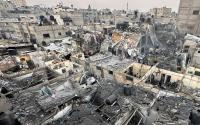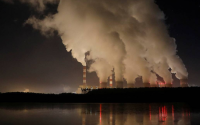8 August 2005MSNBC.comEric Pape
It looked and felt like hell. Swirling winds whipped flames along a 17-kilometer front of pine-forest scrub parched by the fiercest drought on the Iberian Peninsula in 60 years. A dozen firefighters, dwarfed by the massive blaze, fought the flames amid smoke, heat and the blackening countryside of Guadalajara, Spain. Before they could turn to flee, the fire swept over them. Eleven men and women died; the twelfth barely survived. The mid-July blaze was the most spectacular and deadly of the summer—so far. "The hurricane of fire was very big. I didn't think it was fire," Jesus Abad told Spanish television. To the shaken fireman, whose face and arms were bandaged like a mummy, the blaze had a diabolic will of its own: "I think it saw us and said, 'You, you're mine'."
With bursting thermometers, historic droughts and dozens of fires raging from Portugal to Greece, it isn't hard to imagine an apocalyptic future for southern Europe, almost as if the vast Sahara Desert were reaching out across the Mediterranean. Is this merely a long, hot summer, or are these the initial symptoms of enduring climate change, exacerbated by overpopulation and overdevelopment of a fragile ecological landscape? Evidence is mounting to support just such fears.
The Desert Watch project, led by the European Space Agency, reports that 300,000 square kilometers of Europe's Mediterranean coast—an area larger than Britain—with a population of 16.5 million, is threatened by "desertification." The Spanish minister of the Environment, Cristina Narbona, warned in June about a long-term decrease in rain and an increase in temperatures: "the beginning of a long cycle" of extreme drought. And while severe dry spells may be a normal component of —Europe's climate, says Jose Luis Rubio, the head of the University of Valencia's Desertification Investigation Center, a weakening of the soil's resistance to drought among other things, along with human factors, are enhancing the risks of desertification. "We have observed a growing fragility," says Rubio. In places like Valencia, "the water levels are dropping and the soil is weaker."
This doesn't mean sand dunes will be drifting across the streets of Aix-en-Provence or Portofino any time soon. The word "desertification," in Europe, essentially means that the land itself dies and becomes agriculturally unproductive, even if people still build apartments on it or, indeed, greenhouses. And as with the broader debate on global warming, there is plenty of room for error when it comes to long-term forecasts. But optimism among scientists is increasingly hard to find, and the public has fresh memories—not to mention the broiling present—to fuel mounting concerns.
Remember the killer summer heat wave of 2003, when thousands of elderly French died while their children vacationed on beaches? That was the most intense in the 150 years of accurate weather history. This year's baking drought hasn't brought the same record heat—as yet. But eying southern Europe's cloudless skies, it's hard to escape the sense that this is no climatic aberration. Before the end of the century, summer temperatures in Italy are expected to increase by 7 to 8 degrees Celsius, according to the international panel on climate change, the IPCC (which was established by the world meteorological organization and the U.N. environment program). Meteo France projects that in the latter part of this century, 35-degree Celsius days will be "five to ten times more numerous" across the country. The city of Nimes is expected to pass from four scorching days now to 40 by the latter part of this century (from the year 2070 onward), according to projections from Meteo France.
Such changes would transform everything from natural ecosystems—which can change dramatically with a tiny temperature variation—to basic water supplies, agriculture and tourism. Rainfall is expected to decline by 15 percent on average and 40 percent in the scalding summers before the end of the century, according to the IPCC. Experts warn that sea levels could rise as glaciers melt, even affecting the Mediterranean. Warmer weather and changing climates could bring malaria to Europe. And in North Africa the situation will surely be worse, as governments have far fewer resources with which to prepare for the future, says Dieter Schoene, an environmental specialist at the U.N.'s Food and Agriculture Organization. The result: even greater immigration pressure than exists today.
There's little doubt that Europe is getting warmer. During the last century, average temperatures increased by about 0.7 degrees Celsius. The 1990s marked the hottest decade since record-keeping began in the mid-1800s, registering two of the five hottest years ever recorded. This decade has already produced the other three hottest years, from 2001 to 2003. Last year was relatively cool, but the respite has been brief. This year, France has already endured the hottest late June in half a century, and Poland wilted under temperatures of 40 degrees Celsius last week.
With a drier woods and fields, less water and hotter temperatures, the irresponsible people who attempted to prepare an illegal barbecue in Guadalajara, northeast of Madrid, merely precipitated a tragedy-in-waiting. Sixteen other fires burned around Spain at the same time. In some areas there's been no rain since October, and some Spanish water reservoirs are at just 20 percent of capacity. The whole of Portugal is enduring "serious" or "extreme" drought, according a report issued last week by the Portuguese Institute of Water—the worst ever recorded. Streams have dried up. Livestock are dying. Crops are withering. In generally lush France, more than 60 percent of the nation's departments face water restrictions. And the extremely dry weather of recent months has spawned swarms of locusts in France's Aveyron region, eating crops down to the stalks before sweeping through villages.
Farmers are not the only ones to suffer. As rivers fall, industries and hydroelectric plants are affected, says Stefano Ciafani, scientific coordinator of the Italian environmental association Legambiente: "The situation is alarming." Fierce competition for water is altering southern Europe's political relationships. France and Spain are in talks about sending huge amounts of French water to Barcelona, or even further down the Spanish coast. Portugal has asked Spain for 6 billion euros in compensation because water in the Douro River has fallen below levels set in a bilateral agreement. Provincial governments across Spain have begun accusing one another of illegal well-digging, overbuilding and water theft. (One province sent a spy plane to monitor the consumption habits of its neighbors and found ample evidence of misused resources.) "Historically, the Mediterranean has always fought over water," says Rubio. "We are now seeing a —modern version of those historical water wars between regions in Spain."
The weather changes aren't just affecting the shores but the sea as well. Italy's Agency for Technology, Energy and the Environment concluded that its coastal ocean temperatures rose three degrees in the summer of 2003, a sharp spike highlighting a general trend. The Red Sea mullet, a warm-water native of the Suez Canal, has in recent years crossed into the Mediterranean and is now regularly sold in Italian fish markets. Other strange phenomena include the expanding reach of a 6,000-square-kilometer supercolony of Argentine ants that now stretches from Italy through France and Portugal to northwestern Spain. "Everything is linked to the changing climate," says Anne Rogers, senior economist at the U.N.'s Division for Sustainable Development.
The uncertainty gives an ominous undercurrent to this year's summer holidays. By mid-July, temperatures in much of southern France were already between 32 and 37 degrees Celsius. All major French cities have announced Level Three alerts—Four is an emergency—automatically bolstering, among other things, hospital staffing to flu-epidemic levels. Memories of the deadly heat wave of 2003 give every reason to worry. Italy's national statistics office recently revised its 2003 summer death toll, from 8,000 to an astounding 20,000. Overall, the number of European deaths from the heat two years ago is believed to have surpassed 40,000.
Protecting against similar catastrophes will be a long-term battle, not least because of short-term greed. Myopic land and water management figures large in the desertification phenomenon. In Spain, the greatest urban and agricultural expansion is taking place in the driest regions. Farmers can sometimes harvest three to four times annually in southern Spain, requiring plenty of water and depleting the soil. Three decades ago the Almeria region of Spain was verdant farmland. Today it is almost entirely devoid of greenery, thanks to 27,000 hectares of plastic-covered greenhouses. Development and the tourism boom are literally paving over the dying lands, and desiccating the countryside that's left. An estimated 350,000 new homes were built on Spain's Mediterranean coast in 2004, often with backyard swimming pools and nearby golf courses, each of which is estimated to consume as much water as a town of 13,000. Spanish television showed images last week of thousands of dying fish gasping in the depleted and mucky remnants of the Guardiaro River in Cadiz, their water allegedly diverted for urbanization and golf courses.
Against this background, raging wildfires may seem like some sort of Biblical retribution. Already, the average annual acreage burned off in Portugal, Spain, Italy and Greece has quadrupled since the 1960s. The fire that Jesus Abad was fighting in Guadalajara was ferocious almost beyond belief. As aircraft attacked the blaze, their 5,500-liter water-bombs evaporated before making contact. The 30,000-acre conflagration was brought under control only after three days and the bulldozing of a 10-kilometer long, 80-meter-wide fire break through the forest. The Alto Tajo nature reserve, home of numerous endangered species and plants, was left with little more than skeletal, blackened trees craning toward bright blue skies. At the same time, fires in neighboring Portugal were burning their way toward the 100,000-acre mark. Drought has cut Portuguese agriculture's financial projections by an estimated 35 percent this year—a loss of about 1.5 percent of the nation's GDP—and another firefighter was killed there last week. Amid the soaring temperatures, the fires and the locusts, you can almost feel the hot breath of the Sahara as it says to southern Europe, "You're mine."
With Mike Elkin in Santander and Jacopo Barigazzi in Milan






